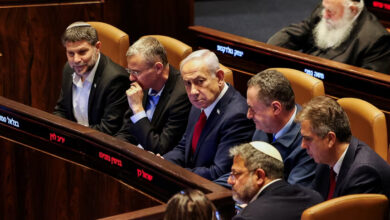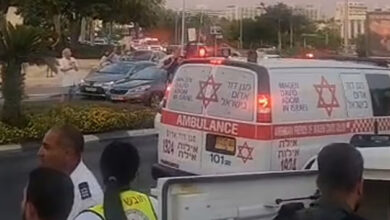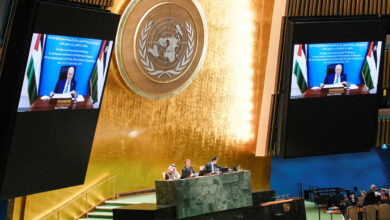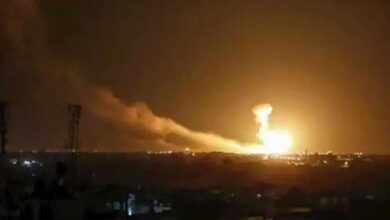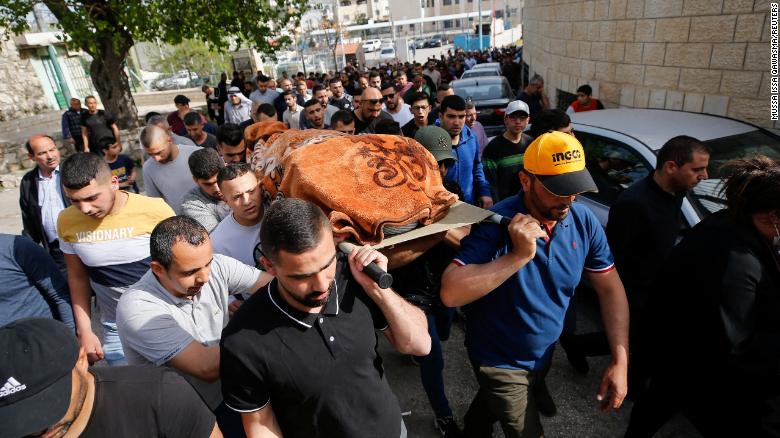
Husan, West Bank (CNN)In the well-appointed house in the West Bank village of Husan, members of Ghada Sabateen’s family welcomed a stream of mourners with bleary eyes.
Sabateen, a 47-year-old widow, mother of six and math teacher, died from her wounds after being shot in the legs by Israeli forces near a temporary military checkpoint in the village on Sunday after the Israeli army said she didn’t heed verbal warnings and ran toward them as they fired warning shots in the air. She was unarmed, according to the Israel Defense Forces.
But Sabateen was mostly blind, her family said. They believe she ran towards the soldiers because she got confused and panicked after the warning shots. Her children, including 14-year-old Jamila, say she was a woman “full of love and kindness” who always tried to stay out of conflict.
Her six children, who range from 11 to 22 years old, looked dumbfounded as they sat in the formal living room of their grandparents’ house, their family members speaking through tears.
Similar scenes of families mourning a loved one lost to this cycle of violence gripping Israel and the West Bank have taken place in Israeli homes, just a few dozen miles away, after 11 civilians and three uniformed security officers were killed in a wave of attacks, including a mass shooting last week at a busy bar in the center of Tel Aviv.
After those attacks, Israeli military operations in the occupied West Bank increased as forces conducted raids they said were connected to the attacks or aimed at preventing future ones. The atmosphere has been incredibly charged. Since Sunday, at least four Palestinians and one Israeli were shot dead by Israeli forces. In all but Sabateen’s case, the Israeli military said soldiers opened fire in response to violent acts. In one of the cases, a woman stabbed a border police officer; in another, a man threw Molotov cocktails at cars, the army said.
Enter your email to subscribe to the CNN Business Newsletter.
close dialog
Sabateen’s family said that after she was shot it took at least 15 minutes before anyone was allowed to approach her. By the time she reached the hospital, she had died from blood loss, Sabateen’s aunt said. The Israeli military said its soldiers followed protocol for a person acting suspiciously and gave initial medical aid. Video from the scene shows a soldier working on Sabateen, her body shielded by pieces of cardboard for modesty reasons, the IDF said. The IDF said it is investigating the incident.
“When I saw the video of her getting shot I felt emptiness, I felt that my soul left me, I wished it was me,” Ghada’s son Mansour told CNN.
Representatives of the European Union and United Nations have condemned Sabateen’s killing. The EU’s delegation to the Palestinians said in a tweet “Such excessive use of lethal force against an unarmed civilian is unacceptable.”
Sabateen’s family said it wants the soldier, or soldiers, who pulled the trigger to be held responsible.
“I felt very angry when I saw the video, I do not know where to go with all this anger,” Ghada’s 20-year-old son Mohammed said.
It’s hard to pinpoint a trigger point for this latest wave of violence. Israeli officials say the attacks are “lone wolf” actions, without any grand organizations behind them. That makes them harder to prevent.
And though Palestinian Authority President Mahmoud Abbas has condemned the attacks on Israeli civilians, he remains under pressure, not least from the United States, to withdraw financial support for the families of people who carry out attacks.
Prime Minister Naftali Bennett — facing his own political crisis after losing a parliamentary majority — has vowed swift action to prevent further attacks, saying on Sunday “the State of Israel has gone on offense … there are no restrictions on [Israeli security forces] in the war against terrorism.”
Such rhetoric has set off red flags in the West Bank, as Palestinian Authority Prime Minister Mohammed Shtayyeh accused Israel on Monday of enacting a “shoot to kill” policy.
Dr. Mustafa Barghouti, President of the Palestinian National Initiative political party, told CNN the recent wave of violence stems from the Israeli government pushing aside any sort of political peace process, and instead promoting a policy aimed at opening economic opportunities for Palestinians, like more work permits, with the hope that it will achieve peace.
“Trying to say Palestinians will just accept the situation if their economic situation will improve is a myth,” Barghouti said.
Barghouti said Palestinians are angry not only at the Israeli occupation, but also at the US for breaking its promises about reopening a consulate for Palestinians. And perhaps just as important, there are deep frustrations with their own political leadership for failing to hold democratic elections, and also with the international community for what Barghouti said is a double standard as they watch the West sanction Russia for its actions in Ukraine, while ignoring Israel.
But things could get worse, especially if the religious tensions mount even higher as Ramadan, Passover and Easter all overlap this weekend. Israeli officials say a group of Palestinians vandalized the site believe to be the burial tomb of the Biblical prophet Joseph in the West Bank town of Nablus.
At the same time, extremist Jewish groups have announced they plan to go to the Temple Mount, known by Muslims as the Noble Sanctuary and home to the Al Aqsa Mosque, to pray and practice the ancient Jewish ritual of sacrificing a lamb before the Passover holiday.
Such an act is seen by the Palestinians as incredibly provocative. Under the agreement put in place with Jordan in 1967 that manages Jerusalem’s holiest site, Jews are not allowed to pray at the compound, although in recent years increasing numbers of extremist Jewish groups have been openly praying at the site. Palestinians want East Jerusalem, where the compound is located, as the capital of their future state.
“The most dangerous thing is provocations against the Al Aqsa Mosque and it could lead to an explosion in the whole area,” Barghouti warned, evoking the 11-day war last May between Hamas-led militants in Gaza and Israel.
Lebanon’s Prime Minister Najib Mikati said on Monday that he will visit Saudi Arabia during the Muslim fasting month of Ramadan, Al-Jadeed TV reported.
- Background: Diplomatic ties between Lebanon and some Arab states have been strained over the years amid the growing influence of the Hezbollah movement, which is backed by Iran. Relations hit rock bottom last year after a former Lebanese minister openly criticized Saudi Arabia.
- Why it matters: The announced visit will be the latest of a number of steps showing improved relations between Lebanon and its neighbors, especially Saudi Arabia. Saudi Arabia, Kuwait and Yemen last week announced they are bringing back their ambassadors to Lebanon. Improved ties might open doors for increased support that can help Lebanon’s deteriorating economy get back on its feet.
Iran’s Khamenei says country’s fate should not depend on nuclear talks
Iran’s supreme leader Ayatollah Ali Khamenei said on Tuesday that the Islamic Republic’s future should not be tied to the fate of the nuclear talks, Iranian state media reported.
- Background: Negotiations to revive a 2015 nuclear deal have thus far been stalled between Iran and Western powers. “Absolutely do not wait for nuclear negotiations in planning for the country and move forward,” Khamenei told a gathering of senior officials. “Do not let your work be disrupted whether the negotiations reach positive or semi-positive or negative results.”
- Why it matters: Iran’s economy has been gravely hit by Western sanctions, which were especially brutal after then-President Donald Trump imposed a “maximum pressure” campaign to clamp down on Iranian influence in the region. Iran then began violating limits imposed on its nuclear program.
Dubai Electricity shares surge at trading debut after biggest regional IPO since Aramco
Dubai Electricity and Water Authority (DEWA) shares on Tuesday jumped about 20% on the first day of its trading at the Dubai Financial Market.
- Background: DEWA last week offered $6.1 billion in the Gulf’s biggest initial public offering (IPO) since Saudi Aramco’s record $29.4 billion IPO in 2019. Dubai’s deputy ruler said that DEWA had attracted 315 billion dirhams ($86 billion) of demand for the IPO,
- Why it matters: The IPO will raise money for Dubai and aims to help its stock exchange compete more strongly with bigger regional rivals including Saudi Arabia and Abu Dhabi. The public share sale is Dubai’s biggest.
A skit on Saudi TV mocking US president Joe Biden has gone viral on Twitter.
A recent clip from the show Studio 22 featured an actor impersonating Biden in a press conference on Russia. The scene depicts an apparently senile, loopy, and jaded Biden in need of help from Vice President Kamala Harris. The clip has been viewed more than 7 million times on social media.
Ramadan is prime time for TV viewing in the Middle East. It’s the season that takes the bulk of the budgets of advertisers and content creators, and it’s also a time for artists to showcase their talent and push the envelope on social and political taboos.
Countries like Syria, Kuwait and Lebanon always have a mix of drama and comedy series every Ramadan, but Saudi television has upped its game in attracting regional audiences.
Studio 22 is a comedy show on state-owned MBC that tells the story of a bankrupt TV channel trying to survive against all odds. The show features satirical impersonations of multiple celebrities and political figures such as Boris Johnson, Will Smith, and even the pride of Arabs, footballer Mo Salah.
This type of mockery of a US president, while occurring amid tense Saudi-US relations, isn’t a first. Another show on MBC called Wi-Fi previously mocked both Donald Trump and Barack Obama while they were in office.
Studio 22 has raised eyebrows before. Adil al-Kalbani, the former imam of the Grand Mosque in Mecca, said in a TV interview this month that he may take legal action against the show after it performed a skit poking fun at his turnaround from imam at Islam’s holiest site to promoting government-backed entertainment festivals in television ads. In the promotional campaigns for the Riyadh Season festival, the former imam was depicted as a Game of Thrones ‘Free Folk’ character.

